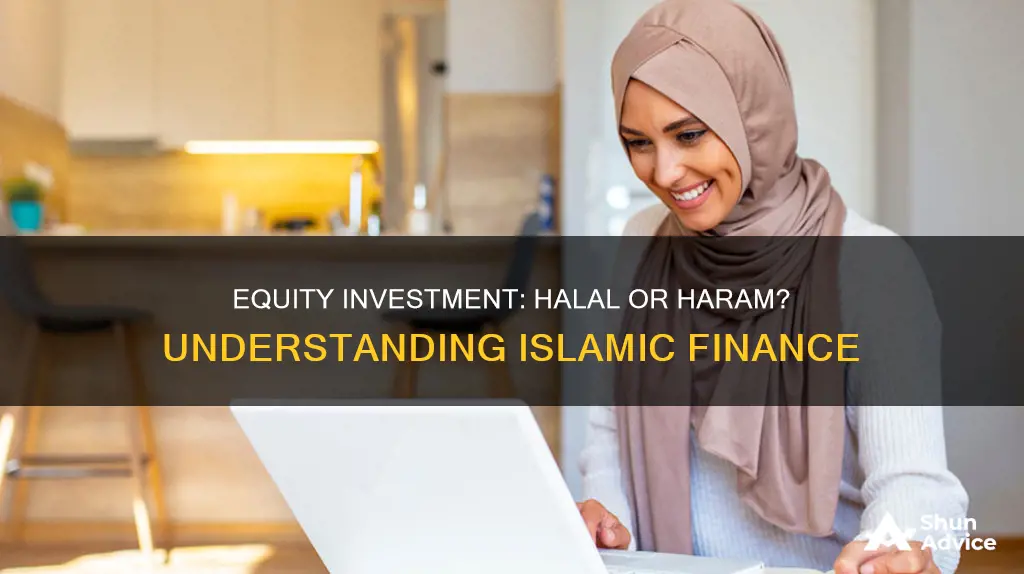
Equity investments are halal as long as they are Shariah-compliant. Shariah-compliant investments channel money into financial ventures that are in accordance with Islamic principles derived from the Quran, Hadith, and Sunnah.
To be Shariah-compliant, investments must avoid riba (interest), gharar (uncertainty), and maisir (speculation or gambling). They must also avoid investing in companies that operate in industries that are considered haram, such as alcohol, gambling, pornography, pork, and interest-bearing financial products.
Equity funds are mutual funds that primarily invest in the equity stocks of several companies. As interest-bearing securities are not permissible in Islam, only equity funds are Shariah-compliant.
- HSBC Islamic Global Equity Index
- Schroders Islamic Global Equity Fund
- Amana Mutual Funds Trust Growth Fund Investor (AMAGX)
- Azzad Ethical Fund ADJEX
- Wahed FTSE USA Shariah ETF HLAL
What You'll Learn
- Halal investments must avoid riba (interest)
- Halal investors must avoid prohibited industries, such as alcohol and gambling
- Halal investors should avoid excessive risk and uncertainty
- Halal investors can invest in stocks, as long as the company is compliant with Islamic law
- Halal investors can invest in real estate, as long as interest-bearing loans aren't used

Halal investments must avoid riba (interest)
Islamic banking has developed workarounds to avoid riba, such as profit-sharing systems and Murabaha, where borrowers agree to return a portion of profits instead of paying interest. Sukuk, or Islamic financial certificates, are also structured to comply with Sharia law by avoiding interest and providing returns derived from profit-sharing.
When investing in equities, it is crucial to ensure that the companies involved are Sharia-compliant. This means they must operate in permissible sectors, have low debt levels, and engage in ethical practices. Screening processes are often employed to identify companies that meet these criteria.
Some scholars argue that a degree of compromise is necessary when defining Sharia-compliant businesses due to the prevalence of conventional banking operations and interest-based finance. However, the consensus is that interest-based transactions should be avoided as much as possible to adhere to Islamic principles.
Ethereum Investment in India: A Beginner's Guide
You may want to see also

Halal investors must avoid prohibited industries, such as alcohol and gambling
Halal investors must avoid industries that are prohibited by Islamic law, or sharia. This includes companies that produce, sell, or offer liquor, pork, or engage in immoral services such as gambling, discos, prostitution, nightclubs, and pornography.
Islamic scholars have established financial guidelines to determine when a business activity is a core source of revenue and when it is not. The "five percent rule" says that a core business activity is one that accounts for more than five percent of a company's revenue. If a company's non-compliant revenue or holdings exceed five percent, then investing in the company is forbidden.
- Alcohol production or sales: All transactions related to alcohol, including its production, trade, investment, and consumption, are impermissible according to the Quran.
- Gambling: This includes casinos, betting companies, and games of chance, lotteries, and speculation. Gambling is impermissible since it is based on chance and creates wealth from chance instead of productive activity.
- Pork or other forbidden food products: The manufacture, trade, investment, and consumption of pork and pork-related items such as fat and gelatin are against Shariah.
- Conventional financial services: The conventional financial institutions that deal with interest, including banks, investment and insurance companies, are against Shariah principles.
- Adult entertainment: Media sectors, including promiscuity and nudity as part of their business model, are against Shariah.
- Tobacco: Tobacco has proven to harm people's lives, and Islamic scholars have declared its use haram for Muslims.
It is important to note that the interpretation of Islamic law as applied to business activities can vary, and different standards exist. Therefore, Muslim investors often rely on guidance from Islamic scholars to determine whether an investment is halal.
Selecting Investment Managers: Key Considerations for Success
You may want to see also

Halal investors should avoid excessive risk and uncertainty
Halal investors should avoid investments that involve excessive risk and speculation, as these are considered forms of gambling, which is also prohibited. This includes derivatives such as options, futures, and other speculative financial products.
To avoid excessive risk and uncertainty, halal investors should stay away from transactions with significant debt, contracts with unclear clauses, short-selling, and deferring payments or deliveries to an unspecified future date. It is also important to avoid investments involving contracts where ownership of an asset is dependent on future events, as these are considered speculative and haram.
By avoiding excessive risk and uncertainty, halal investors can ensure that their investments are in line with Islamic principles and promote socio-economic justice and mutually beneficial partnerships.
Savings Investment Strategies: Accessibility and Growth
You may want to see also

Halal investors can invest in stocks, as long as the company is compliant with Islamic law
Halal investments are those that are permissible under Islamic law, or Shariah law, which is derived from the Quran, Hadith, and Sunnah. Shariah law prohibits interest, sales of alcohol, sales of pork, conventional banking and insurance, and other activities.
Halal investors should focus on asset-based investments, such as stocks, as money is considered a medium of exchange that holds no intrinsic value in Islam. Returns on asset-based investments are created through the appreciation of the asset's value over time. Stocks are considered halal as long as the industry in which the company operates and its financial practices don't violate Islamic law.
To be considered halal, a company must pass Shariah screening, which is based on two main criteria: sector screens and accounting screens. Sector screens prohibit investment in companies involved in activities such as conventional banking and insurance, financial and capital markets, interest-bearing investments, sales of pork, alcohol, and tobacco, music CDs, adultery and pornography, advertising, and media and entertainment. If a company's revenue from such activities is below 5% of its total income, it will be further evaluated using accounting ratios.
Accounting ratios are used to limit interest-bearing debts and investments. The most widely accepted criteria for these ratios are the S&P Shariah Screening criteria, which are based on leverage compliance and cash compliance. The specific ratios are as follows:
- Debt/Market Value of Equity (36-month average) < 33%(Cash + Interest-Bearing Securities)/Market Value of Equity (36-month average) < 33%
- Accounts Receivables/Market Value of Equity (36-month average) < 49%investment in such a company is allowed.
Intel's India Investment: Strategic Business Expansion
You may want to see also

Halal investors can invest in real estate, as long as interest-bearing loans aren't used
Halal investments are those that are permissible under Shariah law. Shariah law prohibits certain financial activities, including riba (interest), gharar (uncertainty in a transaction), and maisir (speculation or gambling).
When it comes to real estate, there are several ways for Halal investors to invest while adhering to Shariah principles. Here are some options:
Rental Property
Investing in rental property, either residential or commercial, allows investors to generate a regular income stream through rental income. As a landlord, it is important to ensure that the property is financed with Shariah-compliant methods, such as paying with all-cash or using Islamic finance structures approved by Islamic scholars. It is also crucial to ensure that the property is not used for impermissible activities, such as selling alcohol or gambling.
Islamic Real Estate Investment Trusts (i-REITs)
I-REITs are similar to conventional REITs but with Shariah compliance. They are companies or trusts that pool investors' money to purchase, operate, manage, and sell income-generating properties that comply with Shariah requirements. i-REITs must appoint Shariah advisors or committees to monitor their conformity with Shariah rules. These investments offer good dividend yields and liquidity, and they can be easily traded on major stock exchanges.
Real Estate Crowdfunding
Crowdfunding platforms provide an opportunity for everyday investors to collectively invest in properties or real estate projects. This approach offers a lower entry point and allows investors to earn passive income without the burden of managing the properties. However, it is important to ensure that the underlying assets and structures are Shariah-compliant.
It is worth noting that while real estate investing can provide stability, tangibility, and long-term wealth-building opportunities, it is not completely risk-free. As with any investment, careful consideration and due diligence are necessary to ensure that the investment aligns with one's financial goals and risk tolerance.
India's Bilateral Investment Treaty: Benefits and Challenges
You may want to see also
Frequently asked questions
Halal investing offers a disciplined, conservative, and long-term approach to building wealth. It promotes a principled, thoughtful approach to investing and provides a structured framework for sustainable, long-term growth.
The need to comply with Shariah guidelines narrows down the universe of potential investments, limiting diversification. This restricted pool of investment opportunities can increase the risk of loss, especially when certain sectors are off-limits.
To determine if a stock is halal, you must consider the company's business activities and financial structure. Avoid companies that engage in haram activities, such as alcohol production, gambling, or interest-based transactions. Also, look for low levels of interest-bearing debt and strong ethical standards.







